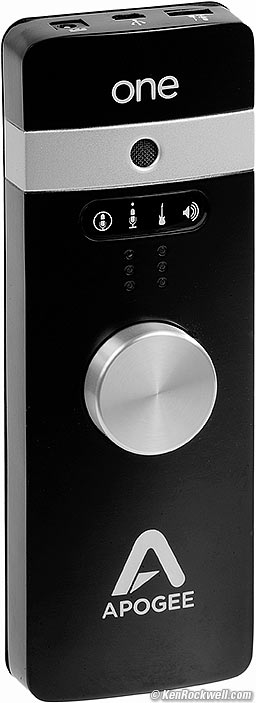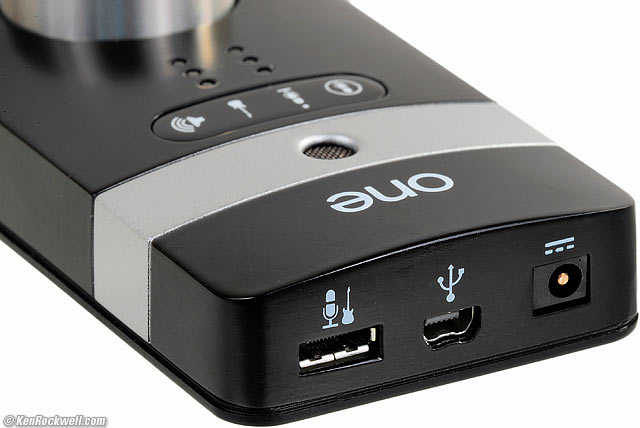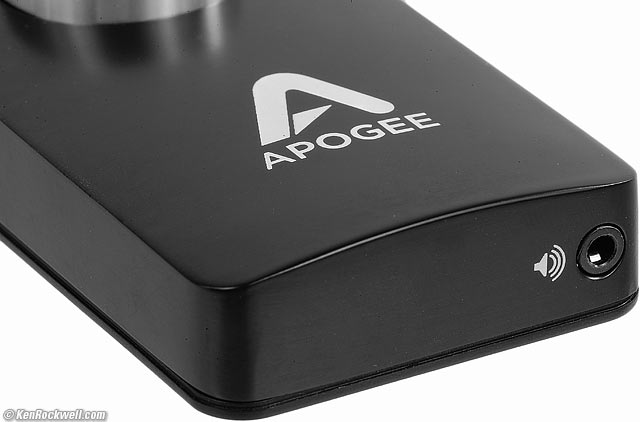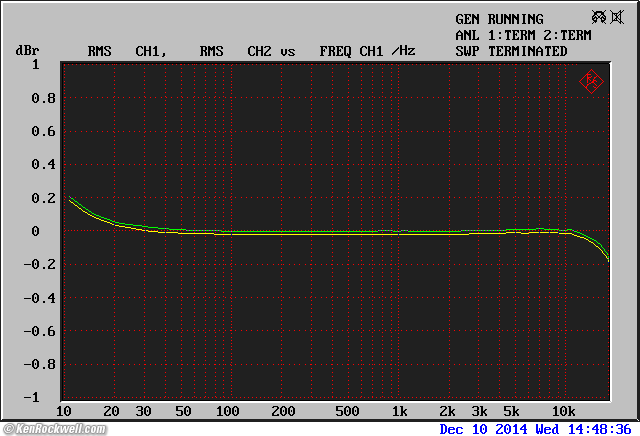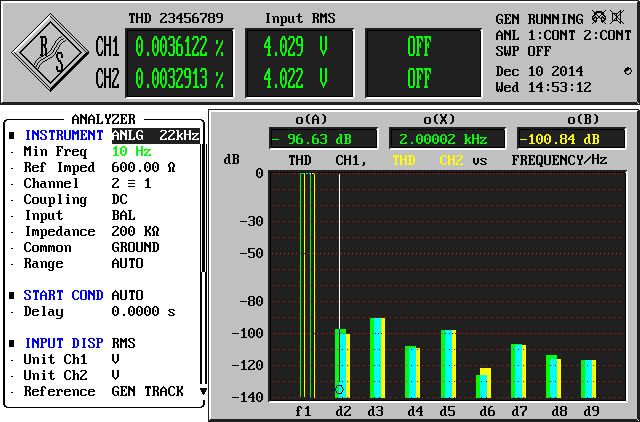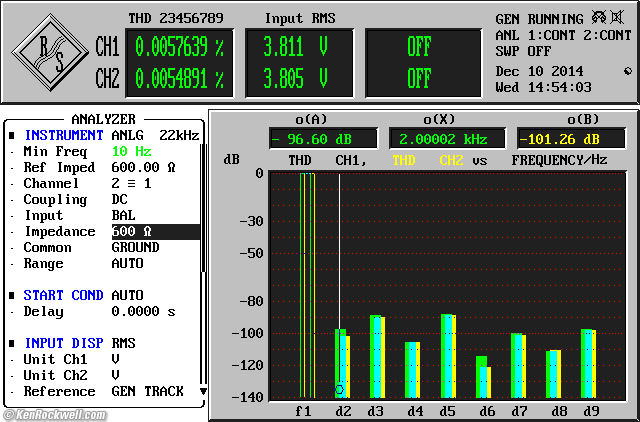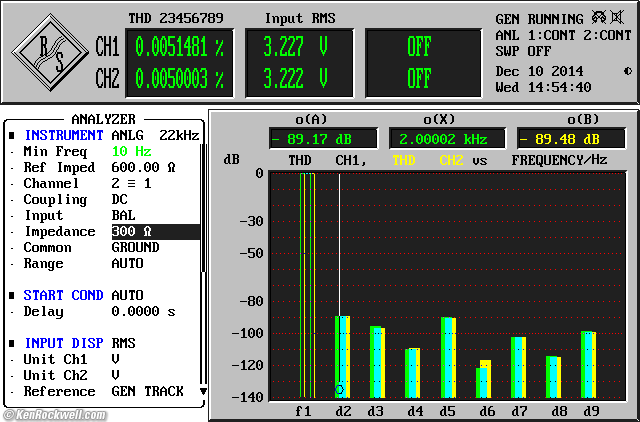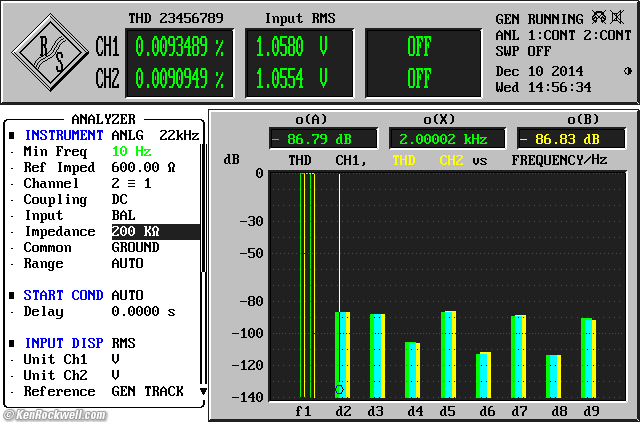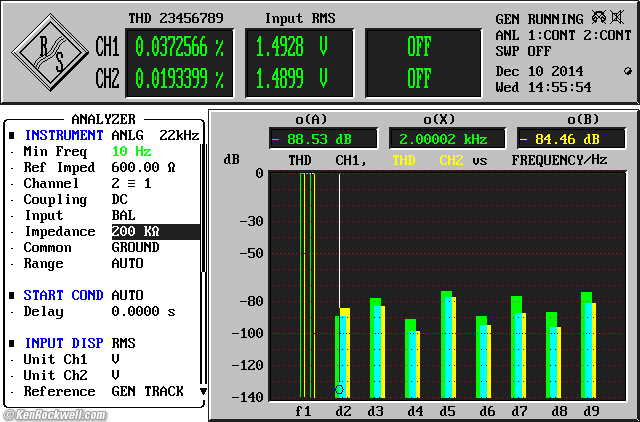Home Donate New Search Gallery Reviews How-To Books Links Workshops About Contact
Apogee One for iPad & Mac
Portable Recording I/O & Amp (2014-)
All-metal and MADE IN USA
© 2014 KenRockwell.com. All rights reserved.
Intro Specs Measurements Usage Recommendations More
Apogee One for iPad, iPhone and Mac. larger. (8.2 oz/234g with 2-AA eneloop, about $349). This all-content, junk-free website's biggest source of support is when you use these links, especially this link to them at Amazon, at Adorama or at B&H, when you get anything, regardless of the country in which you live. Thanks! Ken.
Top, Apogee One for iPad, iPhone and Mac.
Bottom, Apogee One for iPad, iPhone and Mac.
Christmas 2014 All Reviews > Audio Reviews > Apogee Reviews
Notable
Much higher output than most headphone amplifiers; ideal for use with professional 300Ω and 600Ω headphones.
As much headphone output as professional studio headphone amplifiers like the Benchmark DAC1 HDR.
Small, all-metal and Made-in-USA for professional use.
Self powered when in the field.
Charges iOS devices when powered by included AC adapter.
Works with most recording software and plays from anything.
Built-in basic color level meters.
Superb audio performance and fantastic ergonomics; in a class by itself.
Missing
For professional use only (Mac and iOS); no Windows or Android.
Only one input channel for recording (use Duet 2 for stereo input).
No TOSLINK, Coax or AES digital inputs or outputs.
Introduction top
Intro Specs Measurements Usage Recommendations More
The Apogee One for iPad, iPhone and Mac is the best portable DAC and headphone amp I've tested. By portable, I mean one that plugs into an iOS device and needs no external power to play. It's the best because it has the most and cleanest output, it's the best made (all metal), and it has the best ergonomics: a big volume knob right where you need it.
It's a very inexpensive piece of professional music recording hardware; so for $349, it's a no-brainer. You can pay a lot more, and get a plastic off-shored audiophile toy with a lot less out output and dinkier sound.
While designed for professional musicians recording in the field, it just happens to have a superb 24/96 DAC and hot-rodded headphone amplifier built-in. For the same price as plastic imported consumer audiophile garbage, you can ignore the professional ADC and Mic inputs and just use this as the best portable headphone amplifier I've used.
Pop in 2-AA cells, plug it into your iOS device, and it plays. It also works at up to 96 ksps (kHz) and 24-bits both for playback and for recording.
Playback is in stereo, but it has but one input channel for recording. It's presuming you'll be recording multitrack one at a time. It's also superb for field production and voice-over because it includes a built-in high quality mic.
Not only does it sound fantastic; it's super easy to use. Plug it in, and the big knob controls volume in 1 decibel clicks over a wide range. I have no idea why consumer gear makes it so hard to control levels; this pro piece of gear does it right with a big knob.
It also works great plugged into your Mac for use on your desk. Be sure to load Apogee's Maestro software to get the most out of it.
This metal beauty is well padded and isn't going to slide around your desk. It's the perfect combination of sturdiness and light weight. It's a solid bar of precision, and the volume control is a dream to spin.
The volume control is fantastic. The big knob is easy to see and turn with a fingertip as it sits on your desk. Few preamplifiers or DACs have a level control that works over such a wide range. It's easy to set a precise level anywhere from a soft background whisper to completely deafening — all with no audible amplifier noise.
On first listen, the One for iPad, iPhone and Mac immediately impresses with smooth, detailed powerful, dynamic and elegant natural sound. As a professional studio product, we're getting live in-studio sound with impact and solid, tight and potent deep bass. It adds no audible noise of its own over a huge volume control range, so music comes strongly out of inky black silence at any level setting.
As a product designed for musicians, it has to sound exactly like the music they just recorded a moment ago, and not only does it have to sound good, it has to be as loud as live — or louder. You can't get a better headphone amplifier, but you sure can pay more.
It works extremely well with headphones like the 300 Ω Sennheiser HD 650 with which I tried it.
It gets slightly warm as used. When the batteries are low, the two red LEDs will flash.
You can control the level from your iOS device's volume buttons.
A good deal of your favorite CDs and LPs were probably recorded through Apogee converters, so you've been hearing Apogee for a long time.
Nobody knows how to make a great-sounding converter better than Apogee, and the hits prove it. Decades ago their equipment was very expensive, but today, this same technology is what's inside this little Apogee One for iPad, iPhone and Mac. We all can buy professional studio-level equipment for less than most of the audiophile drivel out there that costs so much more and sounds so much worse.
Specifications top
Intro Specs Measurements Usage Recommendations More
See also Apogee's One for iPad, iPhone and Mac Specifications page for details.
Inputs
Built-in professional omnidirectional microphone
XLR pro mic preamp with 48V phantom power, or 1/4" instrument input via included breakout cable
iOS via Lightning or 30-pin
USB
Outputs
3.5mm headphone jack
iOS via Lightning or 30-pin
USB
Power
USB.
2-AA (or the included AC adapter) for portable iOS use when not connected to USB.
Apogee recommends Ni-MH cells; I use eneloop.
When plugged into the AC adapter, the One will charge a connected iOS device.
Size, including projections
6.3" × 2.2" x 1.2" tall, including knob.
(160 × 57 × 30 millimeters.)
Weight
8.235 oz. (233.5g) with 2-AA eneloop.
Quality
MADE IN THE UNITED STATES OF AMERICA.
Die-case aluminium case.
Included
One for iPad, iPhone and Mac.
Breakout Cable.
Mic stand adapter.
Mac USB cable.
Mine came with both Lightning and 30-pin iOS cables; I'm not sure which ones are standard.
AC Adapter with integral interchangeable plugs for US, UK and EU.
Quick Start Guide.
Software download and installation instructions (No CD; Apogee wants you to get the latest software direct from them.)
Measurements top
Intro Specs Measurements Usage Recommendations More
Volume Control Channel Tracking
These measurements were made with an exotic Rohde & Schwarz UPL laboratory analyzer at the headphone output. These are playing the CBS CD-1 test disc as encoded direct-from-CD as ALC through iTunes and played from my iPhone 6 Plus' Music app. These measurements best represent how well the One for iPad, iPhone and Mac will work in the real world playing CD-based music. Used with fancier software like Logic or Pro Tools at 24-bits or higher sample rates from your own masters any you may get even better performance.
All measurements at at 1 kHz at 0 dBFS unless otherwise noted.
The traces from the Rohde & Schwarz UPL laboratory analyzer are color coded for the Left Channel and for the Right Channel. When they don't lie on top of each other, it's due to channel imbalance.
I tested only the headphone/analog output. I did not test the analog input and ADC converter.
Maximum Output Levels measurements top
It puts out a solid 4 Volts, or sixteen times the power of most portable devices and battery powered headphone amps.
Load |
RMS @ 0 dBFS |
mW |
dBm |
dBu |
dBV |
200 kΩ |
4.03V @ 0.003% THD |
- |
- |
+14.3 dBu |
+12.1 dBV |
600 Ω |
3.81V @ 0.005% THD |
24 mW |
+13.8 dBm |
+13.8 dBu |
+11.6 dBV |
300 Ω |
3.22V @ 0.005% THD |
35 mW |
+15.4 dBm |
+12.4 dBu |
+10.2 dBV |
37.5 Ω |
1.49V @ 0.02% THD |
59 mW |
+17.7 dBm |
+5.7 dBu |
+3.5 dBV |
37.5 Ω |
1.05V @ 0.009% THD |
29 mW |
+14.7 dBm |
+2.6 dBu |
+0.4 dBV |
With test tones at 0 dBFS it's perfectly happy at full level at 300 Ω.
Loaded with 37.5 Ω, it doesn't like anyone trying to run it at full level. At more than 1.5V continuous output it gives up and flashes its red lights back and forth, letting you know the sanity cops need to have a word with you. This is for your own good; most 32 Ω headphones blow out at continuous levels above that! It's that loud.
Output Source Impedance measurements top
35.4 Ω.
Noise measurements top
With the output level set to 1 V at 0 dBFS:
-98.7 dBV A-weighted, playing zeros. This is a good 16 effective bits.
-106 dBV A-weighted, muted.
Volume Control measurements top
The volume control moves in 1 dB clicks down to about -63 dB from maximum.
At 0 dBFS, the output ranges from +12 dBV to -50 dBV in 1 dB steps, then is -81.5 dBV and -145 dBV at the last two clicks.
Channel Tracking measurements top
The right channel was 0.0174 dB less than the left.
As an electronic attenuator, it's within ±0.01 dB or so at all settings.
Frequency Response measurements top
Frequency response. (CBS CD-1 track 11, R&S UPL.)
Frequency response is unchanged at 200 kΩ or 37.5 Ω.
Look at the expanded vertical scale: this is flat ±0.2 dB from 10 cycles to 20 kc!
THD: 0.003% (-90 dB) measurements top
Harmonic components at maximum output, 200 kΩ load. (R&S UPL.)
Harmonic components at maximum output, 600 Ω load. (R&S UPL.)
Harmonic components at maximum output, 300 Ω load. (R&S UPL.)
Harmonic components at 1 V output, 37.5 Ω load. (R&S UPL.)
Harmonic components at 1.5 V output, 37.5 Ω load. (R&S UPL.)
Usage top
Intro Specs Measurements Usage Recommendations More
Power
No power switch needed, it turns on by magic.
Needs two AA for portable power, otherwise USB powers it.
Software
It plugs right into iOS for playback.
To use it with Mac, you first must install the Maestro software on your Mac, downloaded from Apogee.
For optimum use with iOS, especially for recording, download the Maestro app.
Meters
The meters read the level of modulation of the digital input signal, not the analog output level as set by the output level controls.
Green mean's you've got a strong signal, yellow means it's getting very strong, and if you see red you're over. I suspect it goes from green to red at -12 dBFS and to red at 0 dBFS.
Big Knob
The big knob only rotates. Tapping it won't play, mute or pause your audio.
You tap the knob to select which level you are going to change: built-in mic, external mic, instrument input, or Headphone output.
Analog Outputs
The 3.5mm jack is for headphones, or for input to other audio equipment like your preamp or powered speakers.
Recommendations top
Intro Specs Measurements Usage Recommendations More
The Apogee One is intended for professional musicians when they are away from the studio and have a great idea they need to record onto their iPad or MacBook, or need to get some tracks recorded and sent out while they are on the road.
The fact that it just happens to have a great DAC and headphone amp is a bonus, and why most readers will get this.
This is pro equipment. It's designed expecting you plug your U-87 into its input and a $1,500 pair of 600 Ω headphones into its output.
If all you want to do is enjoy music from your iOS device, I've never seen the point of hauling a separate DAC just so I could use high-impedance studio headphones while out in the field. The whole point of the One is to save yourself from having to haul a bunch of other stuff so you can record. For less than the cost of this DAC, I prefer to use my Beyerdynamic T51i headphones directly plugged into my iOS device. The T51i are intended for portable use and need no amplifier or DAC, saving us more to carry and plug in.
At any price, the Apogee One for iPad, iPhone and Mac is a spectacular DAC and headphone amplifier for serious professional high-impedance headphones. It is this good because of its super-high quality output, its extremely high gain and maximum output level. As a pro piece of gear, it has enough gain so you can hear the noise between tracks, and enough output level to deafen even your drummer.
If you're using 32 Ω headphones and an iOS device, you probably don't need this as a headphone amplifier, while for 600 Ω headphones you do need all the extra output the One provides.
Consider this if you use high-impedance (200 Ω or more) headphones in the field. You probably don't need it if your headphones play loudly enough from your iOS device.
I use the Grado Mini Adapter to use the professional 1/4" plug headphones for which this is optimized.
If you're on amateur gear like Windows or Android, you need to step up to Mac and iOS for many reasons, as well as to be able to use this device.
Its built-in mic is much better than your iPhone's or headphone's mic; the One's mic is full-range without the sharp bass cutoff of the iOS built-in mics.
For about $349, the One for iPad, iPhone and Mac is a no-brainer for professional quality portable audio, although it's more for the travelling musician to save him from having to haul even more gear. I personally prefer to use headphones optimized for portable use when I'm in the field. to enjoy music than carry more gear just so I can use large studio headphones — but that's just me.
If you've found the week I spent researching and measuring all this, this all-content, junk-free website's biggest source of support is when you use these links, especially this link to them at Amazon, at Adorama or at B&H, when you get anything, regardless of the country in which you live.
Thanks!
Ken.
More Information top
Intro Specs Measurements Usage Recommendations More
Apogee's One for iPad, iPhone and Mac Quick-Start Guide.
Apogee's One for iPad, iPhone and Mac users manual.
Apogee's One for iPad, iPhone and Mac information page.
Help me help you top
I support my growing family through this website, as crazy as it might seem.
If you find this page as helpful as a book you might have had to buy or a workshop you may have had to take, feel free to help me continue helping everyone.
If you've gotten your gear through one of my links or helped otherwise, you're family. It's great people like you who allow me to keep adding to this site full-time. Thanks!
If you haven't helped yet, please do, and consider helping me with a gift of $5.00.
As this page is copyrighted and formally registered, it is unlawful to make copies, especially in the form of printouts for personal use. If you wish to make a printout for personal use, you are granted one-time permission only if you PayPal me $5.00 per printout or part thereof. Thank you!
Thanks for reading!
Mr. & Mrs. Ken Rockwell, Ryan and Katie.
Home Donate New Search Gallery Reviews How-To Books Links Workshops About Contact

